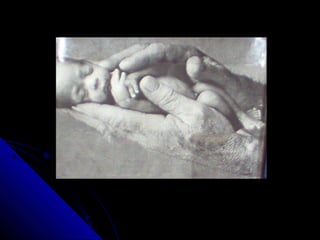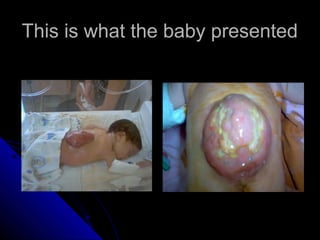Myelomeni..
- 2. CASE  The pediatrician is called to the delivery room because an infant is born with a defect in the lumbosacral area.
- 3. This is what the baby presented
- 4. MYELOMENINGOCELE Cases from Hospital Manuel de Jesus Rivera “La Mascota” National Children’s Hospital Managua, Nicaragua IMELDA MEDINA, MD
- 5. MYELOMENINGOCELE  Neural  The tube defect most severe form of dysraphism involving the vertebral column.
- 6. MYELOMENINGOCELE Etiology  Unknown  It is thought that agents such as drugs, radiation, malnutrition (Specially folic acid deficiency during prenatal period), and genetics have a role in adversely affecting normal CNS development.
- 7. MYELOMENINGOCELE Clinical Presentation  Defect in the Lumbosacral region  Bowel and bladder incontinence  Physical Exam:  Flaccid paralysis of lower extremities  Absent deep tendon reflexes, lack of response to touch or pain  Postural abnormalities including clubfoot or subluxed hips may be present.  80% develop hydrocephalus associated with Type II Chiari defect.
- 8. MYELOMENINGOCELE Prenatal Diagnostic Studies  Prenatal screening of AFP (AlphaFetoprotein acetylcholinesterase) at 16-18 weeks.  AFP is excreted from the fetus and leaks into the amniotic fluid when there is failure of the neural tube to close.
- 9. MYELOMENINGOCELE Treatment  Prenatal Folic acid and vitamins, adequate nutrition and Ob/Gyn care  Multidisciplinary care needed (Pediatrics, Neurology, Urology, Neurosurgery, Occupational/Physical therapists, etc).  Surgical repair of Lumbosacral defect and ventriculo-peritoneal shunt for those who develop hydrocephalus.
- 10. MYELOMENINGOCELE  Complications  Potential Herniation of the medulla and cerebellar tonsils through the foramen magnum secondary to Chiari II malformation  Monitor for clinical presentation: Feeding problems, drooling, choking, DEATH if left untreated.  Infections: Meningitis, UTI’s Treat with IV antibiotics  Prevent UTI’s with frequent catheterizations 
- 11. MYELOMENINGOCELE
- 16. Ventricular Puncture Hospital Manuel de Jesus Rivera “La Mascota” Marina Morales, MD; Miguel Angel Guevara, MD
- 17. Ventricular Puncture Hospital Manuel de Jesus Rivera “La Mascota” Marina Morales, MD; Miguel Angel Guevara, MD
- 18. BIBLIOGRAPHY  9.Nelson’s Textbook of Pediatrics. Berhrman RE, Kliegman R, Jensen Hal, W.B. Saunders Co, Philadelphia, 2000, 16th ed. P 1804-1806.  Hospital Manuel de Jesus Rivera “La Mascota.” Neonatal Intensive Care Unit Department, Isolation Unit. Photos taken by Imelda Medina, MD with informed consent from parents and faculty at the Institution. March-May 2005
- 19. THE END
























